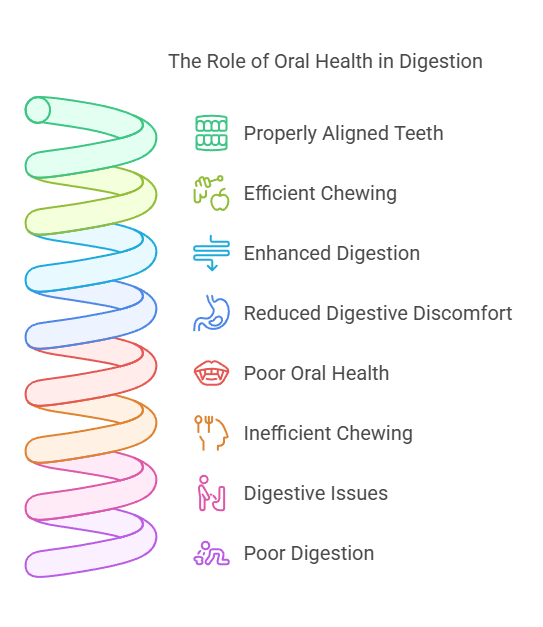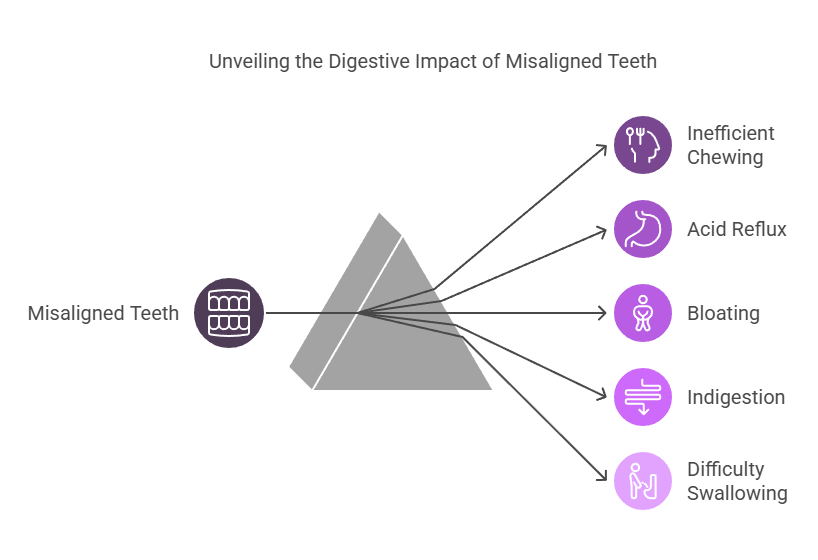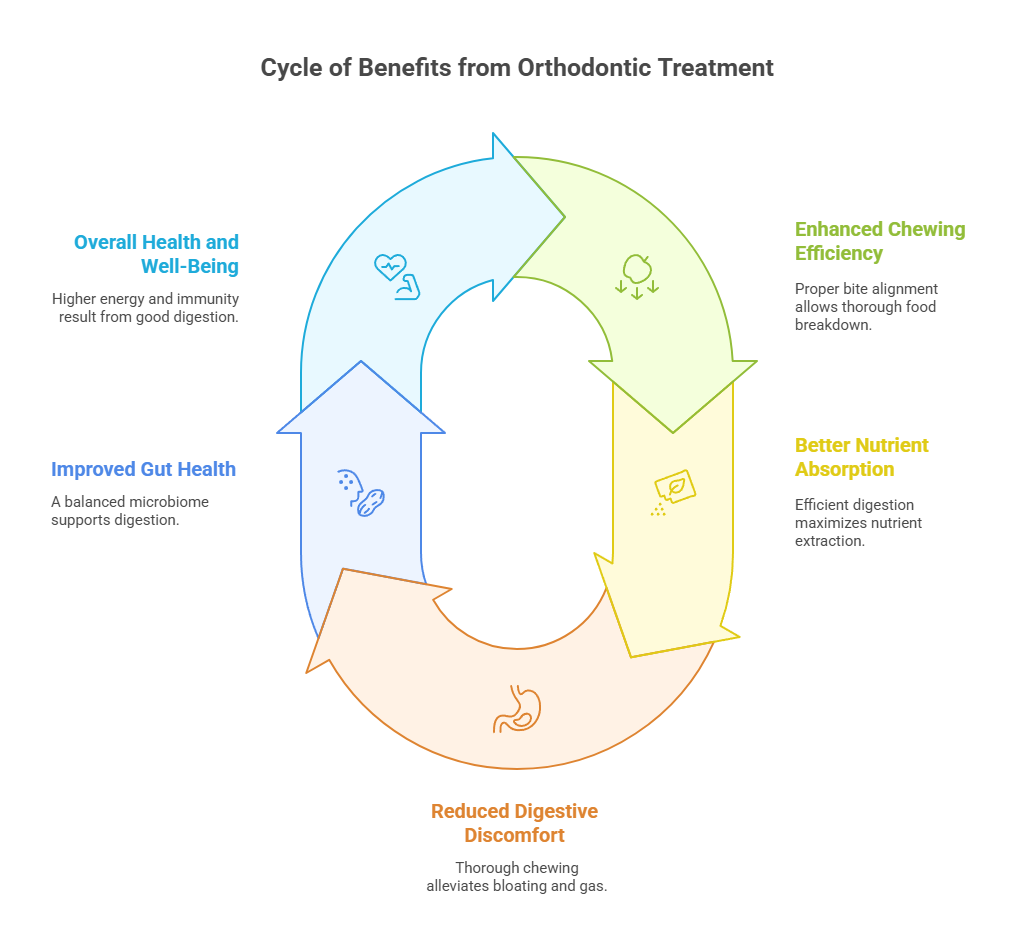The Connection Between Oral Health and Digestion
The digestive process begins in the mouth, making oral health an integral part of the digestive system. The alignment of teeth and jaw plays a crucial role in ensuring that you can chew food properly, which is essential for proper digestion. Proper oral health promotes better digestion by ensuring efficient chewing and reducing digestive discomfort, while poor oral health can contribute to a range of digestive issues, ultimately affecting better digestive health.

The Impact of Misaligned Teeth on Digestive Health
Misaligned teeth can lead to digestive discomforts such as acid reflux and bloating, as well as other health problems. When teeth and jaws are not properly aligned, chewing becomes inefficient, making it difficult to break down food effectively. This places additional strain on the digestive system, which has to work harder to process improperly chewed food, ultimately affecting better digestive health.
Poor chewing can lead to problems such as acid reflux, bloating, and indigestion. The stomach and intestines rely on adequately broken-down food to extract essential nutrients, and when this process is disrupted, it can impact overall health. Additionally, individuals with misaligned teeth may experience difficulty swallowing, further exacerbating digestive issues.

Nutritional Implications of Misaligned Teeth
Misaligned teeth can have significant nutritional implications, affecting how food is processed and absorbed. Chewing is the first step in breaking down food, and when it is inefficient, it can lead to inadequate breakdown of food particles. This can put additional strain on the digestive tract, leading to discomforts such as bloating, gas, and indigestion.
Properly aligned teeth enable efficient chewing, which is crucial for nutrient absorption. When food is broken down properly, the body can better extract essential vitamins and minerals. Additionally, misaligned teeth can make oral hygiene more difficult, increasing the risk of tooth decay and gum disease, both of which can further impact digestive health. Orthodontic treatments can improve better digestive health by ensuring food is properly broken down and nutrients are efficiently absorbed.
The Role of Orthodontic Treatment in Improving Digestion
Orthodontic treatments are important not only for cosmetic reasons but also for their significant health benefits, particularly regarding digestive health. Orthodontic treatment can play a significant role in improving digestive health by correcting misaligned teeth. Straightening the teeth improves bite alignment, allowing for better chewing efficiency and reducing strain on the digestive system. By ensuring food is thoroughly broken down before swallowing, orthodontic treatment supports overall digestive function.
In addition, properly aligned teeth reduce the risk of digestive issues such as acid reflux and stomach pain. When food is chewed thoroughly, the likelihood of swallowing large, difficult-to-digest particles decreases. This, in turn, leads to smoother digestion and better nutrient absorption, ultimately improving overall health and well-being. Proper alignment not only enhances the smile but also contributes to better digestive health.
How Orthodontic Treatment Affects Gut Health

Benefits of Aligned Teeth for Digestive Health
Benefits of Improved Digestion
There are numerous benefits to improved digestion and better digestive health through orthodontic treatment:
Enhanced Chewing Efficiency: Proper bite alignment ensures food is thoroughly broken down before reaching the stomach.
Better Nutrient Absorption: More efficient digestion leads to better extraction of essential nutrients.
Reduced Digestive Discomfort: Thorough chewing minimizes bloating, gas, and acid reflux.
Improved Gut Health: A well-functioning digestive system supports a balanced gut microbiome.
Overall Health and Well-Being: Proper digestion contributes to higher energy levels, improved immune function, and better overall health.
Overall Digestive Health: Improved chewing techniques and proper dental alignment enhance overall digestive health by facilitating better nutrient absorption and streamlining the digestion process.
How Improved Chewing Aids Digestion
Efficient chewing breaks down food into smaller particles, allowing enzymes in the mouth and digestive tract to work more effectively. This improves the body’s ability to absorb nutrients and reduces the likelihood of digestive issues such as acid reflux and bloating.
Properly aligned teeth ensure food is chewed thoroughly, making it easier for the digestive system to process. The more efficiently food is broken down in the mouth, the less effort is required from the stomach and intestines to digest it. As a result, the risk of experiencing digestive discomfort is significantly reduced, leading to better digestive health.
Maintaining Aligned Teeth for Optimal Digestion
Maintaining aligned teeth is essential for optimal digestion. After orthodontic treatment, it is crucial to wear retainers as prescribed to prevent teeth from shifting back to their original position. Regular dental check-ups are also vital for monitoring the health and alignment of teeth. Good oral hygiene practices, including regular brushing and flossing, are essential for preventing the buildup of plaque and decay that can affect teeth positioning and gums’ health. Additionally, avoiding habits such as nail-biting, pencil-chewing, or using teeth to open things can help maintain the alignment of teeth. By taking these preventive measures, individuals can ensure that their teeth remain aligned, promoting optimal digestion and overall health.
Addressing Grinding or Clenching for Better Oral Health
Grinding or clenching (bruxism) can affect tooth alignment over time, leading to issues such as jaw pain and TMJ disorders. If left unaddressed, bruxism can also contribute to digestive discomforts by putting additional strain on the digestive tract. To help find a solution for grinding or clenching, a dentist may recommend using a night guard to prevent the adverse effects of these actions on teeth alignment. By addressing bruxism, individuals can promote better oral health, reduce the risk of digestive issues, and maintain properly aligned teeth. Regular dental check-ups can help identify bruxism early on, allowing for prompt treatment and prevention of related oral health issues.
Preventive Measures for Maintaining Aligned Teeth
Ensuring your teeth remain properly aligned is vital not just for cosmetic reasons but also for your overall health, including enhancing digestive health. Here are several essential
Regular Dental and Orthodontic Visits: Routine check-ups help monitor and maintain dental alignment.
Good Oral Hygiene Practices: Brushing, flossing, and using mouthwash help prevent gum disease and tooth decay, which can impact alignment.
Avoid Harmful Habits: Habits such as nail-biting, chewing on hard objects, or using teeth to open packaging can affect dental alignment over time.
Using Retainers Post-Treatment: After orthodontic treatment, retainers help maintain the new position of teeth and prevent them from shifting.

Conclusion
Orthodontic treatment plays a crucial role in improving digestive health and overall well-being. By aligning teeth and jaws properly, it enhances chewing efficiency, promotes better digestion, and reduces the risk of digestive discomfort. Proper oral hygiene and regular dental check-ups are essential for maintaining aligned teeth and ensuring long-term health benefits.
Addressing orthodontic issues is an investment in overall health, leading to better digestive health, improved nutrient absorption, and a higher quality of life. If you are experiencing digestive discomfort, consider consulting an orthodontist to explore how dental alignment might be impacting your digestive health.

